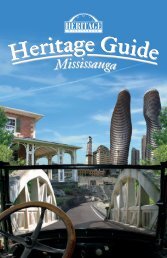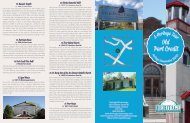A Forgotten Past: Early Black History in Mississauga
You also want an ePaper? Increase the reach of your titles
YUMPU automatically turns print PDFs into web optimized ePapers that Google loves.
Cedar Park Farm<br />
One of the best documented early <strong>Black</strong><br />
families <strong>in</strong> historic <strong>Mississauga</strong> was the Ross<br />
family of Cedar Park Farm. The Ross farm<br />
was located near the modern <strong>in</strong>tersection<br />
of Cawthra and Burnhamthorpe roads, and<br />
Rayfield Park is located on the former Ross<br />
farm. George Woodford Ross (c1796-1878) was an emancipated former slave from<br />
Urbanna, Virg<strong>in</strong>ia. His father and slave-owner was James Ross, a Scottish-born<br />
land-owner. It is difficult to come to terms with a relationship between a slaveowner<br />
and enslaved children. James Ross emancipated his children, of which three<br />
half-brothers came to Canada <strong>in</strong> the 1830s, adopt<strong>in</strong>g the Ross surname (George<br />
Woodford, William Woodford and Corb<strong>in</strong> Lane).<br />
“I, James Ross of Town of Urbanna <strong>in</strong> the County of Middlesex, consider<strong>in</strong>g that my mulatto<br />
slave, Mary Woodford (now deceased) and her daughter, Nancy Woodford, were the gifts of my<br />
two good friends, the late Clement Nicholson and Annie his wife as by their Deed recorded. DO<br />
EMANCIPATE and SET FREE all the children of the said Mary, to wit, Nancy Woodford, Frances<br />
Woodford, William Woodford, David Woodford, and George Woodford .”<br />
In James Ross’ will from 1825, the Cedar Park Farm plantation <strong>in</strong> Virg<strong>in</strong>ia was to<br />
be divided among the Woodford children. It is likely that the capital from this<br />
allowed George Woodford Ross to come to Canada and eventually purchase his<br />
own farm here <strong>in</strong> historic <strong>Mississauga</strong>.<br />
George’s wife was Didamia Paul, who had been a school teacher at the<br />
Wilberforce Settlement near what is now London, Ontario. Didamia’s father,<br />
Benjam<strong>in</strong> Paul, had helped to establish Wilberforce. George and Didamia were<br />
married <strong>in</strong> 1834, and <strong>in</strong> 1836 purchased a 200-acre farm <strong>in</strong> historic <strong>Mississauga</strong>.<br />
George and Didamia Ross had 11 children: Benjam<strong>in</strong> Paul (born 1836),<br />
Elizabeth Adelaide “Eliza” (c1840), Charles Warburton (1843), Kate Mytilene<br />
(1845), Corb<strong>in</strong> Levi (1847), Didemia Anne (1848), Celest<strong>in</strong>e Sarah “Cessa”<br />
(1850), James Woodford (1852), Rebecca Evangel<strong>in</strong>e “Eva” (1854), Alexander<br />
Campbell (1855) and Georg<strong>in</strong>a (1857). The family rema<strong>in</strong>ed <strong>in</strong> the community<br />
for several generations. Rebecca’s son, Private Wilfred Arthur W<strong>in</strong>stanley Cook<br />
of Cooksville, served and fell dur<strong>in</strong>g the First World War.<br />
3<br />
Above: Ross-Cook House, Cedar Park Farm, built circa 1836 by George Woodford Ross, brick<br />
veneer added circa 1870s, purchased by Henry Cook <strong>in</strong> 1919, demolished circa 1975.









